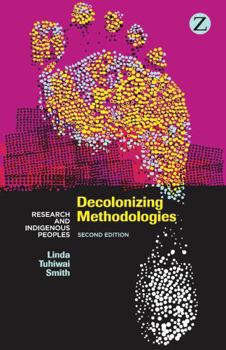Decolonizing Methodologies: Research and Indigenous Peoples
Select Format
Select Condition 
Book Overview
'A landmark in the process of decolonizing imperial Western knowledge.' Walter Mignolo, Duke University To the colonized, the term 'research' is conflated with European colonialism; the ways in which academic research has been implicated in the throes of imperialism remains a painful memory. This essential volume explores intersections of imperialism and research - specifically, the ways in which imperialism...
Format:Paperback
Language:English
ISBN:1848139500
ISBN13:9781848139503
Release Date:May 2012
Publisher:Zed Books
Length:242 Pages
Weight:0.72 lbs.
Dimensions:0.7" x 5.4" x 8.3"
Customer Reviews
5 ratings
A must-read!
Published by Thriftbooks.com User , 17 years ago
I first read this book for a course in Sociocultural Theory in Anthropology. It has stayed on my shelf ever since. Linda Tuhiwai Smith provides insight and deeply meaningful commentary on the field of social research and its place in the indigenous community. This work should be required reading of all students in the social sciences.
Constructing Critical Indigenous Research Methodologies
Published by Thriftbooks.com User , 21 years ago
Looking at Western research practices from the ?underside? of a positivist paradigm deeply entrenched and diffused throughout public and private educational, governmental, and corporate tentacles, Linda Tuhiwai Smith is a Maori (New Zealand) intellectual presenting a counter-methodological narrative stemming from a collective indigenous historical cynicism and whose voice bespeaks the refusal to be objectified by an inherently racist and imperialist mode of constructing knowledge and re-presentations of non-Western peoples. Deconstructing Western research paradigms is simply an act of defiance and resistance for Smith, particularly since she constructs a radical alternative methodology rooted in self-determination, social justice, intellectual property rights, and active participation in all knowledge-making, contributions to the research processes, and dissemination of ?findings?. The exigency of articulating a research methodology aimed at critical praxis for Western and non-Western peoples interested in indigenous issues emerges at a point where globalization and neo-liberal imperial practices and investments are opening new spaces for the unilateral and/or predominant benefit of Western research regimes that continue capitalizing and objectifying indigenous peoples through racist and incorrigible projects that erase human dignity, i.e. Human Genome Diversity Project.The book can strategically be divided into two main sections: the first section explores the contemporary and historical legacy of an imperial tryst between Western scientific, economic, and ideological formations shaping relations with alterity (Chapters 1-5); the second section outlines a radical alternative methodology for conducting research on indigenous peoples and issues (Chapters 6-9). The first chapter reveals the ?Enlightenment? and positivist threads that weave imperialism, history, writing, and theoretical practices that continue to shape current research and socio-political policies on an international level. Smith states: ?research within late-modern and late-colonial conditions continues relentlessly and brings with it a new wave of exploration, discovery, exploitation, and appropriation? (24). Deconstructing the historical legacy of imperial practices is also a call for rewriting and rerighting history with indigenous perspectives. The second chapter outlines the Baconian processes by which Westerners come to view the world as a standing reserve of objects for empirical inquiry, discursive appropriation, and mimetic comportment processes aimed at subjugating and ?controlling? nature and indigenous peoples with an intellectual will to power stemming from racist ideologues who trace some form of theoretical lineage back to Bacon, Kant, Hegel, Hume and others. Borrowing from Stuart Hall, this process moves from classification of the world and others, to collapsing images for a convenient system of representation, to presenting a reified model for comparative ana
Compelling, must-read
Published by Thriftbooks.com User , 21 years ago
Tuhiwai Smith's masterpiece is a must-read for any discipline. Her work questions the most basic assumptions upon which academic research lies; her influence is widely felt in fields as diverse as anthropology, social work, women studies, film studies, indigenous studies, psychology, history, sociology, and ethnic studies. Smith is the Fanon of the indigenous world, and the contemporary academic cannot afford to miss her work.The chapters are absorbing and surprisingly straight-forward for theory, and can be read separately or in sequence. The work is accessible enough for undergraduate students, but rich enough to serve as a valuable addition to the graduate student's bookshelf.She reaches both Native and non-Native audiences, and concludes her work with indiginizing projects that detail real alternatives to current practices. An investment you will not regret!
decolonizing project should be bear in mind
Published by Thriftbooks.com User , 22 years ago
Linda Tuhiwai Smith is absolutely right in describing the fact that as many indigenous persons have themselves become the "researcher", or become "educated" "scholar", they seem to be even farther from their cultures and their peoples. They learned to be "qulified" scholars in their disciplines, for example. being neutral and objective in doing research, without realizing these kinds of methodologies are themselves value-added. This book offers an insight that indigenous researches should be done (either by indigenous or non-indigenous people) with a poltical project, aiming at the decolonization and self-determination of indigenous peoples.And to do so, we need to deliberately review and examine the essence and the politics of the so claimed "scientific" methodologies.This work is inspiring for both researchers and activists.
Brilliant - a must read !!
Published by Thriftbooks.com User , 25 years ago
Linda Tuhiwai Smith captures the essence of the space that is between 'a rock and a hard place' for Maori who engage in research within the academy and the frameworks of western theorisms. She clearly and articulately explores not only this position but also the pathways beyond it. As we engage in the business of contributing to still growing body's of indigenous ways of knowing and doing it is important that we critique our own relative positions as both indigenous and colonised peoples as powerful and purposeful. Linda has set the scene for fabulous things to happen. I have already loaned this book to others and recommended that the others who want it buy it ! Better be quick - they are disappearing from the shelves as you read !!






